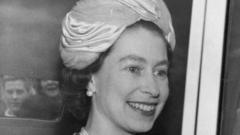In a shocking revelation, newly released MI5 documents disclose that Queen Elizabeth II was not formally informed of Anthony Blunt's admission as a Soviet spy for nearly a decade, raising questions about transparency within the royal court.
Queen Elizabeth II's Unofficial Awareness of Soviet Spy Anthony Blunt Revealed After Decades

Queen Elizabeth II's Unofficial Awareness of Soviet Spy Anthony Blunt Revealed After Decades
Declassified MI5 files show Queen was kept in the dark about her courtiers' espionage for nearly nine years.
Newly declassified files from MI5 reveal that Queen Elizabeth II was kept in the dark regarding the espionage activities of art historian Anthony Blunt, despite his confession to the intelligence agency in 1964. Blunt, the Surveyor of the Queen's Pictures and a key figure overseeing the Royal Art Collection, admitted to his ties with Soviet intelligence dating back to the 1930s.
While Queen Elizabeth learned of Blunt's espionage in the 1970s, it came almost nine years after his confession. The MI5 documents indicate that when she was finally informed, her reaction was remarkably composed; she took the news "without surprise," perhaps indicating prior knowledge of his suspicious activities.
The inquiry into Blunt started in 1951 when fellow spies Guy Burgess and Donald Maclean defected to the Soviet Union, sparking intense scrutiny of their Cambridge Five circle. Although Blunt worked for MI5 during World War II and faced numerous interrogations about his activities, he steadfastly denied any wrongdoing. The pivotal moment arrived when Michael Straight, an American contact, alerted the FBI that Blunt had recruited him.
Confronted by MI5 interrogator Arthur Martin in April 1964, Blunt was granted immunity in exchange for a detailed confession about his affiliations with the Russian intelligence agency post-war. The account describes moments of hesitation during questioning, indicating internal conflict.
Despite the gravity of the situation, few outside the MI5 were privy to Blunt's confession, and only select government officials were informed. The strategy to delay the Queen’s official notification was based on the belief that Blunt’s ill health could prompt media scrutiny.
In March 1973, files document the Queen being told of the situation by her private secretary, suggesting that the Buckingham Palace officials may have sought to maintain a level of plausible deniability regarding her awareness of Blunt's involvement.
Ultimately, the British public learned of Blunt's espionage during a Commons statement by Prime Minister Margaret Thatcher in 1979. Blunt passed away in 1983, having been stripped of his knighthood. These revelations, alongside other related documents, will soon be part of an exhibition at the National Archives, contributing to ongoing discussions about espionage and intelligence in the UK.
MI5’s Director General, Sir Ken McCallum, emphasized the agency's commitment to transparency, acknowledging the intricate balance between secrecy and accountability in matters of national security.





















